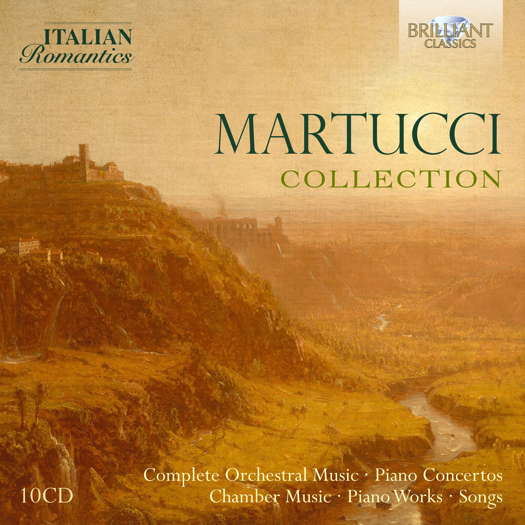- Jennifer Paull
- Bombay
- Thomas Morley
- Joachim Mendelsohn
- Sara Cortolezzis
- Nicole Ansari-Cox
- Joël Marosi
- Elizabeth Alker

Martucci Collection
96920 (Brilliant Classics, CD, 10 discs)
DDD
COMPILATION (1 May 2024)
Booklet pages: 19
© 2024 Brilliant Classics
Main country of recording: Italy
Reviewer: Gerald Fenech
Review of Martucci Collection published on 16 April 2024
Orchestra Sinfonica di Roma
Francesco La Vecchia
Quartetto Noferini
Luca Braga
Lucia Pittau
Roberto Trainini
Massimiliano Ferrati
Alberto Miodini
Chiarastella Onorati
Luisa Prayer
The most comprehensive collection ever released of Giuseppe Martucci's music, in stylish modern recordings by native Italian musicians. An Italian Brahms is an unlikely idea, but it encapsulates a superficial acquaintance with the music of Giuseppe Martucci (1856-1909). Any listener curious to take a deeper dive into the richly Romantic melodies and impassioned large-scale structures of Martucci will find no better place to start than this survey of his major works in every instrumental genre. Martucci grew up in Naples as the son of a military bandmaster, and this background seems to have instilled in him a creative impulse to swim against the operatic tide of native composers, and focus his energies on writing instrumental music. He was an accomplished pianist, received with great enthusiasm on tours of France, Germany and England, and the tremendous sweep of his Piano Concerto loses nothing by comparison with far more familiar examples. Brought to life here by Alberto Miodini, the piano music, too, is intensely wrought, but it never loses a pre-eminence of melody which was Martucci's heritage. In 1888 he conducted the first Italian performance of Wagner's Tristan und Isolde; his song-cycle La canzone dei Ricordi, written a year earlier, is the closest he came to translating the opera's chromatic eroticism into his own music, and this set affords the opportunity to hear the piece in both its orchestral and piano versions; no less enlightening than (for example) the distinct versions of the Four Last Songs by Richard Strauss. CD10 collects Martucci's other songs for soprano, such as the remarkable Pagine sparse of 1888. Other highlights of the set include Martucci's deep investment in chamber music, resulting in piano trios, violin and cello sonatas, and a magnificently brooding Piano Quintet, again in the Brahmsian mould.



